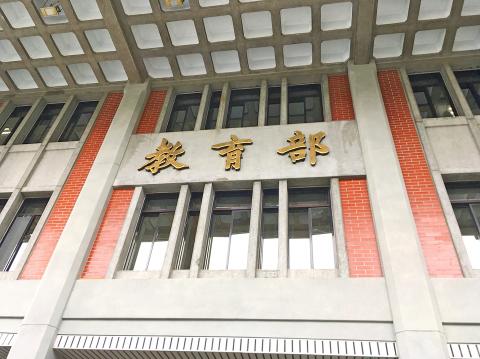The Executive Yuan has formed a task force to investigate academics suspected of breaching cross-strait laws by taking part in China’s Thousand Talents Plan, Minister of Education Pan Wen-chung (潘文忠) said yesterday.
The government would not restrict any cross-strait educational exchanges, but such exchanges should be conducted in an equal and reciprocal manner, and according to the Act Governing Relations Between the People of the Taiwan Area and the Mainland Area (臺灣地區與大陸地區人民關係條例), he said.
Taiwanese academics could break the law if they attend events that promote unification under the pretense of enhancing educational exchanges, he said.

Photo: Rachel Lin, Taipei Times
To prevent people from becoming prey to China’s “united front” tactics, the government would improve efforts to remind people to avoid cross-strait exchanges with political agendas, he said.
While 33 Taiwanese, including several retired teachers and six to seven professors and researchers, are said to have joined the program, Pan said the government is still investigating whether the allegations are true.
To counter China’s attempts to recruit Taiwanese talent and obtain Taiwanese technologies through the program and other state-funded research initiatives, the ministry has been planning to tighten regulations on cross-strait partnerships.
It drafted amendments to regulations to require universities to notify the ministry before launching partnerships or holding exchanges involving a political agenda with Chinese schools.
According to Article 33-1 of the act, unless approved by the ministry, universities and their employees cannot collaborate with Chinese individuals or organizations on political issues or matters that could affect national security, or jointly establish organizations for political purposes.
Participating in the program could contravene the article.
Amid rumors that Chinese universities allow Taiwanese public university professors to take part-time positions under assumed names to avoid repercussions in Taiwan, Department of International and Cross-strait Education Director-General Bi Tzu-an (畢祖安) said that anyone doing so would still contravene the law, as such university professors are banned from taking part-time positions.
When Taiwanese academics visit Chinese universities to give speeches, the host universities sometimes claim that they are honorary professors at the institution, he said, urging academics to watch out for such situations.

MAKING WAVES: China’s maritime militia could become a nontraditional threat in war, clogging up shipping lanes to prevent US or Japanese intervention, a report said About 1,900 Chinese ships flying flags of convenience and fishing vessels that participated in China’s military exercises around Taiwan last month and in January last year have been listed for monitoring, Coast Guard Administration (CGA) Deputy Director-General Hsieh Ching-chin (謝慶欽) said yesterday. Following amendments to the Commercial Port Act (商港法) and the Law of Ships (船舶法) last month, the CGA can designate possible berthing areas or deny ports of call for vessels suspected of loitering around areas where undersea cables can be accessed, Oceans Affairs Council Minister Kuan Bi-ling (管碧玲) said. The list of suspected ships, originally 300, had risen to about

DAREDEVIL: Honnold said it had always been a dream of his to climb Taipei 101, while a Netflix producer said the skyscraper was ‘a real icon of this country’ US climber Alex Honnold yesterday took on Taiwan’s tallest building, becoming the first person to scale Taipei 101 without a rope, harness or safety net. Hundreds of spectators gathered at the base of the 101-story skyscraper to watch Honnold, 40, embark on his daredevil feat, which was also broadcast live on Netflix. Dressed in a red T-shirt and yellow custom-made climbing shoes, Honnold swiftly moved up the southeast face of the glass and steel building. At one point, he stepped onto a platform midway up to wave down at fans and onlookers who were taking photos. People watching from inside

Japan’s strategic alliance with the US would collapse if Tokyo were to turn away from a conflict in Taiwan, Japanese Prime Minister Sanae Takaichi said yesterday, but distanced herself from previous comments that suggested a possible military response in such an event. Takaichi expressed her latest views on a nationally broadcast TV program late on Monday, where an opposition party leader criticized her for igniting tensions with China with the earlier remarks. Ties between Japan and China have sunk to the worst level in years after Takaichi said in November that a hypothetical Chinese attack on Taiwan could bring about a Japanese

STREAMLINED: The dedicated funding would allow the US to transfer equipment to Taiwan when needed and order upgraded replacements for stockpiles, a source said The US House of Representatives on Thursday passed a defense appropriations bill totaling US$838.7 billion, of which US$1 billion is to be allocated to reinforcing security cooperation with Taiwan and US$150 million to replace defense articles provided to the nation. These are part of the Consolidated Appropriation Act, which the US House yesterday passed with 341 votes in favor and 88 against. The act must be passed by the US Senate before Friday next week to avoid another government shutdown. The US House Committee on Appropriations on Monday unveiled the act, saying that it allocates US$1 billion for the Taiwan Security Cooperation Initiative